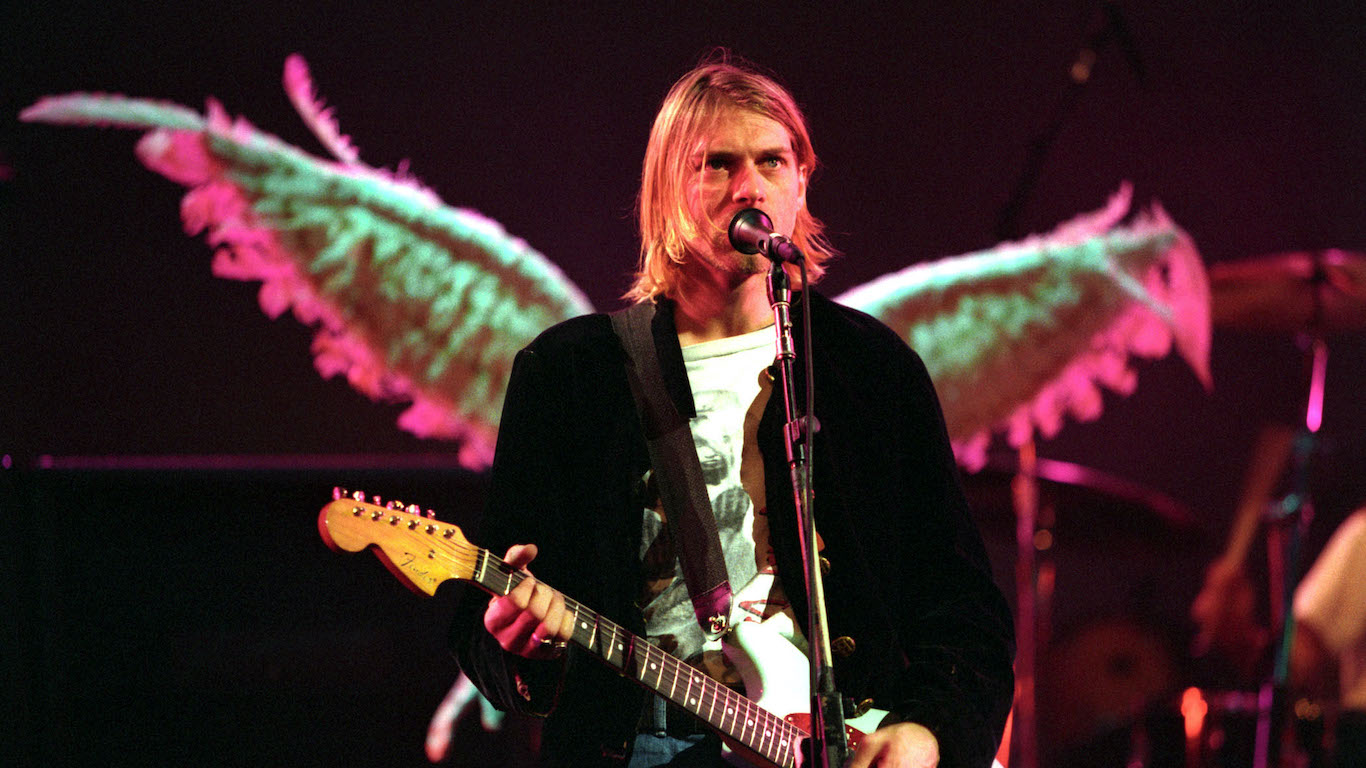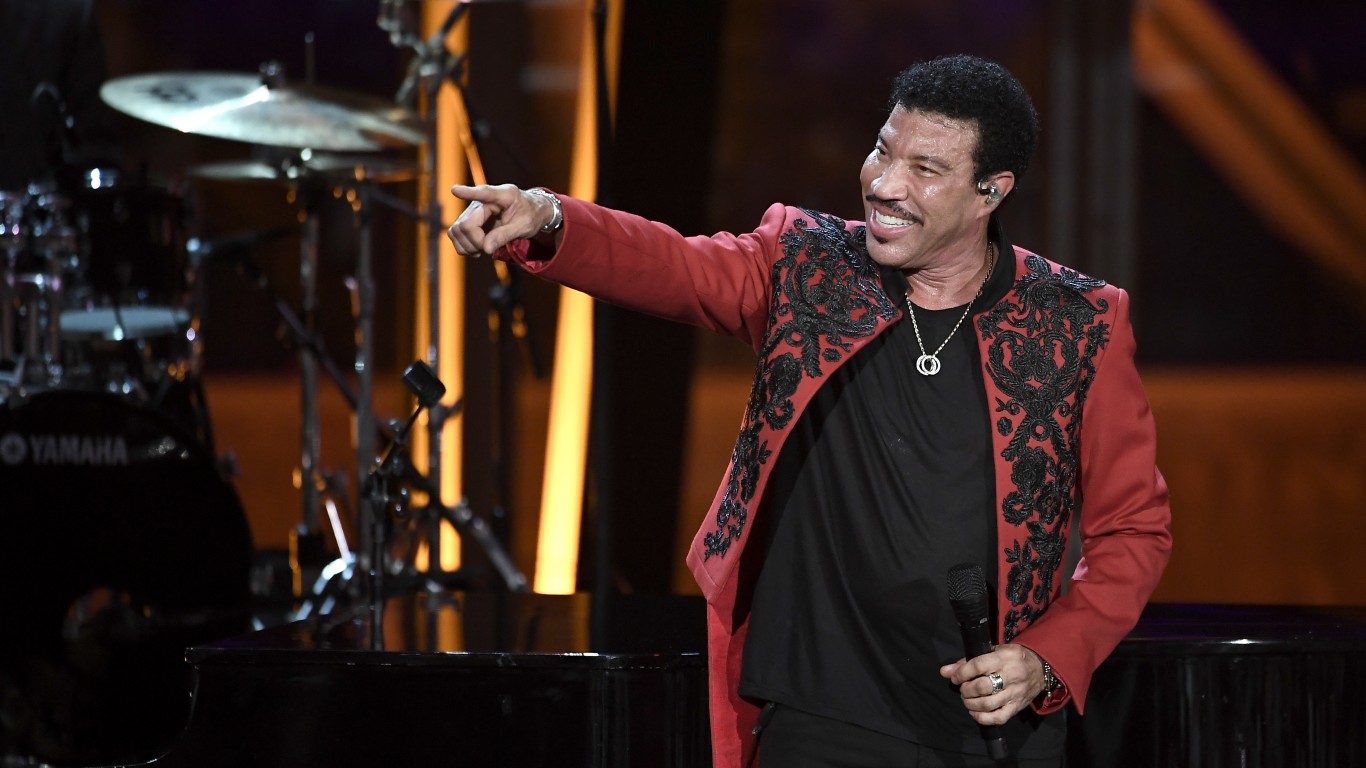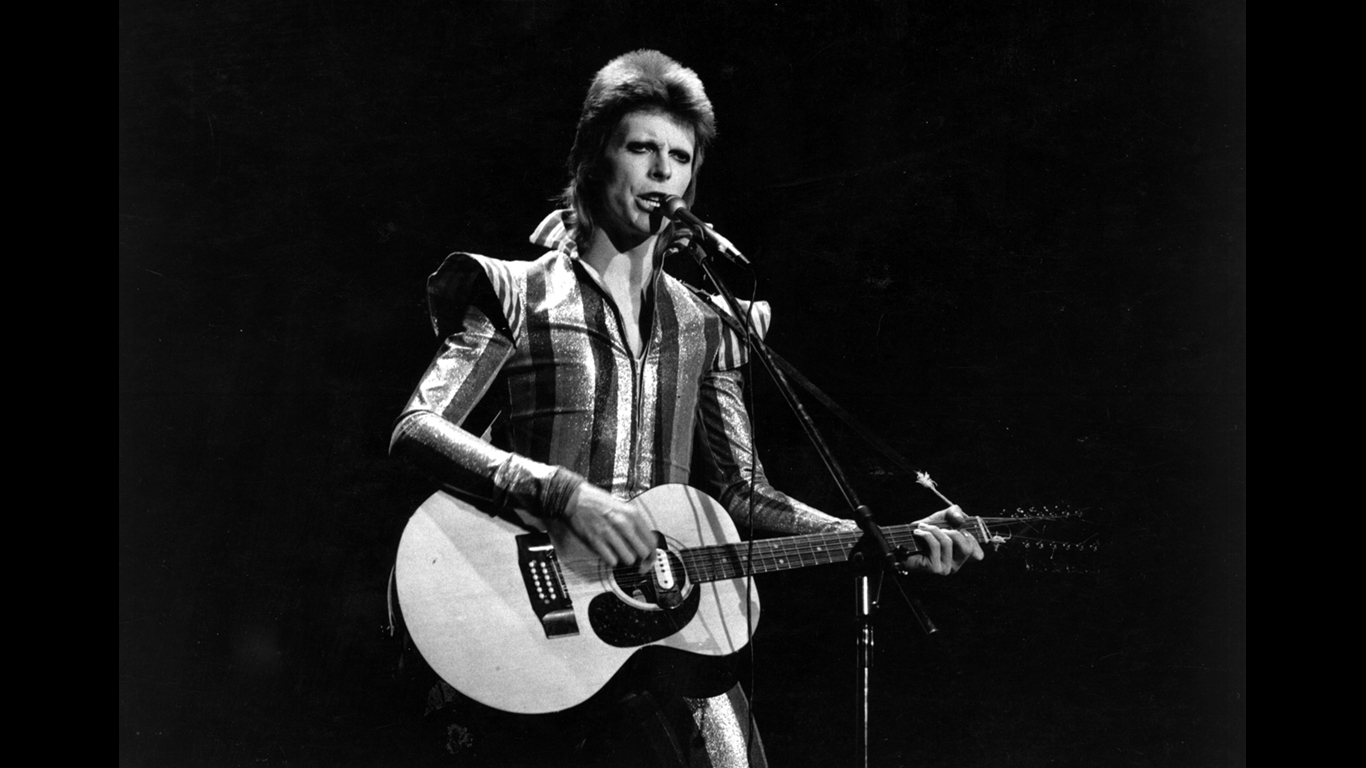
“Music hath charms to soothe the savage breast. To soften rocks, or bend the knotted oak.” It’s an old saying (sometimes attributed to William Shakespeare but actually written by William Congreve), but it holds true. Music can make us happy when we’re sad, sad when we’re happy, nostalgic about the past, or excited about the future. It can inspire us to work out or help us relax, speed up our heartbeat or lull us to sleep.
There’s music for every mood and every occasion, and it’s not always by different artists. Some musicians are known for their versatility of subject matter and approach, not only embracing different genres but also spanning a vast emotional range over the course of their careers.
Based on a paper published as a part of a conference on artificial and computational intelligence held in Brazil, 24/7 Tempo has determined the musicians with the most emotionally diverse output since the middle of the last century. We used data categorizing songs by themes such as sadness, movement/places, and family/spiritual to reveal the probability that two random songs in an artist’s catalog will be thematically distinct. (Here is the most popular song every year since 1970.)
Click here to see the musicians with the most diverse output
Click here to read our detailed methodology
Our findings might come as a surprise to some people. The list is dominated by musicians who haven’t been in the charts for decades. Some of the names might not even be known to Gen Z listeners. The top five are B.B. King, Perry Como, Nina Simone, J.J. Cale, and Ella Fitzgerald, all of them deceased. (Here are 35 musicians with legendarily long careers.)
It’s interesting to speculate why there are almost no contemporary artists on our list. One reason, of course, is that the longer musicians have been performing, the more time they have to experiment with different styles. Another reason may be the segmentation of taste due to the recent proliferation of satellite radio and streaming services – which may discourage musicians and their audiences alike from venturing outside their comfort zones.
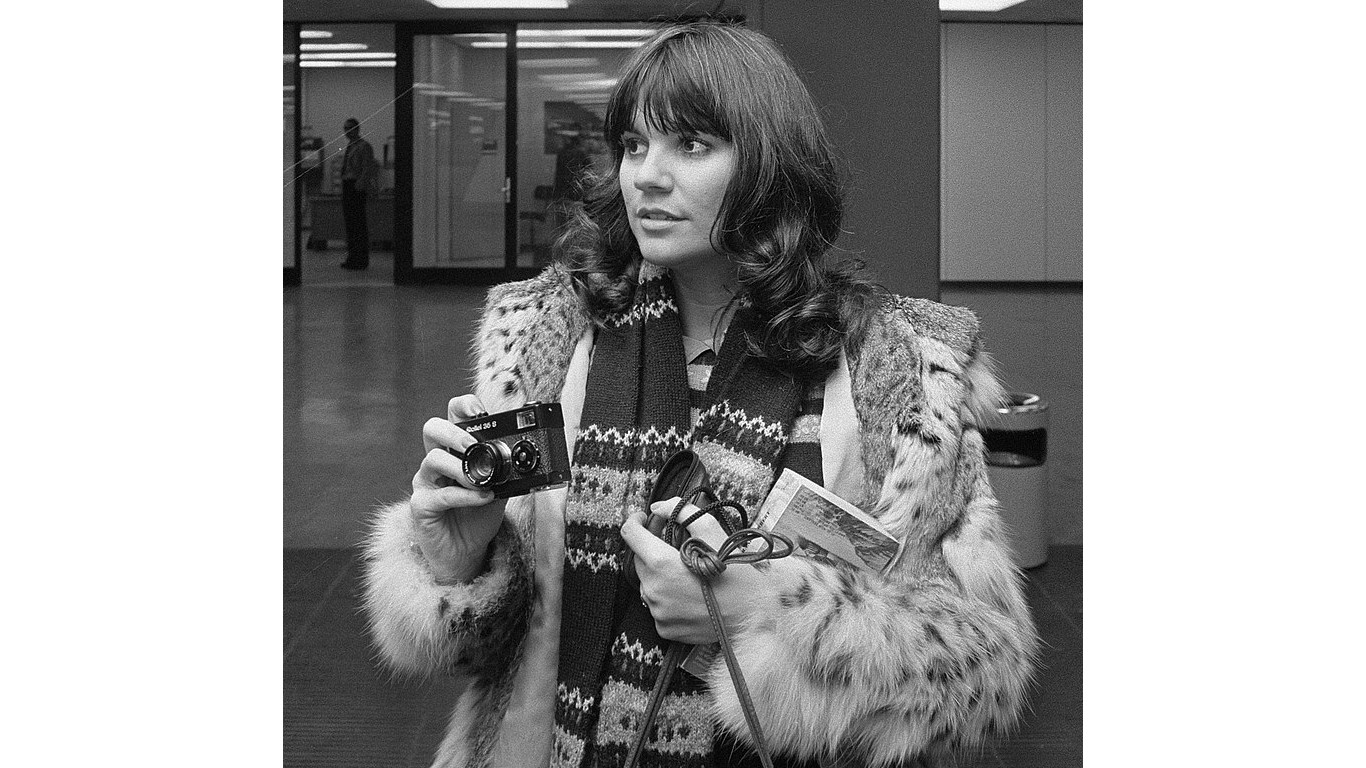
25. Linda Ronstadt
> Probability two random songs in catalog will be thematically distinct: 83.7%
> Billboard Hot 100 hits: 34
> Time on the Hot 100 chart: 406 weeks
> Biggest Hot 100 hit: Different Drum (No. 13 for 1 week)
[in-text-ad]
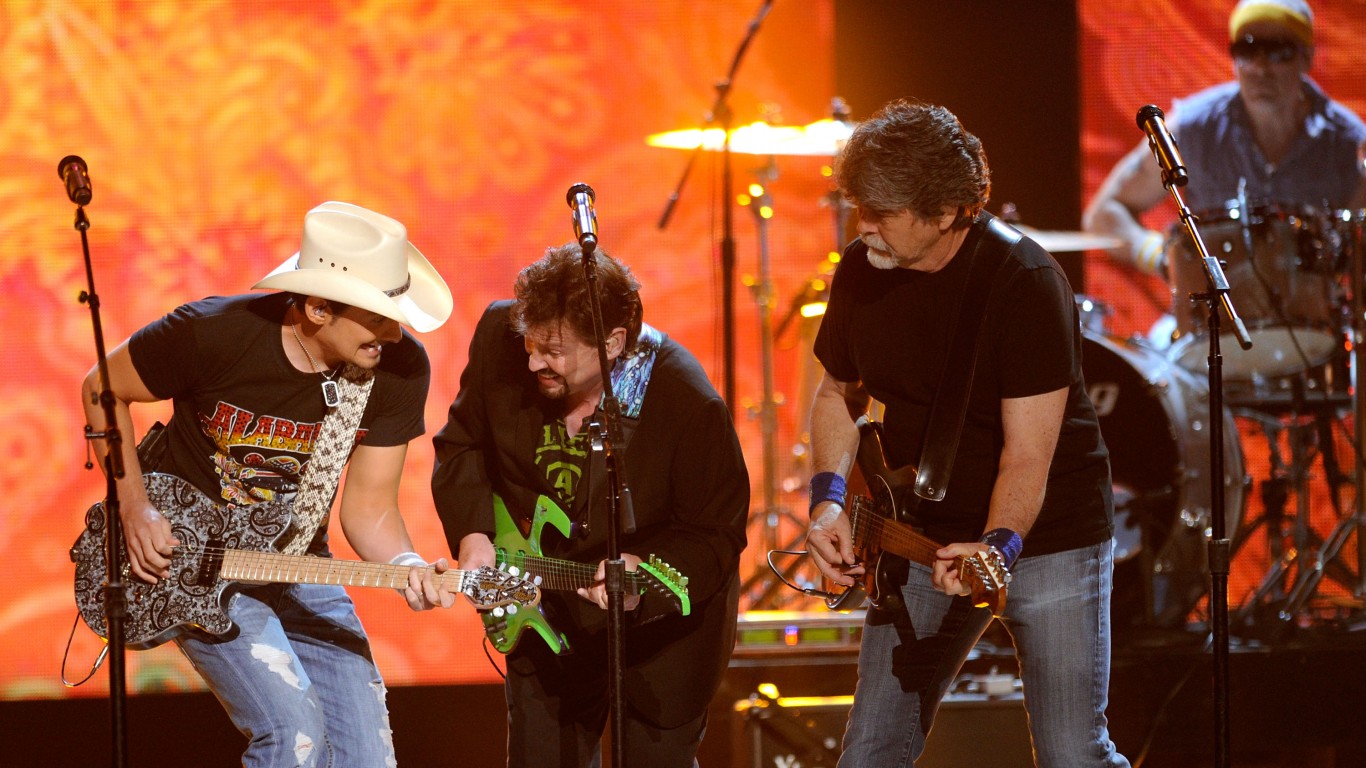
24. Alabama
> Probability two random songs in catalog will be thematically distinct: 83.7%
> Billboard Hot 100 hits: 11
> Time on the Hot 100 chart: 148 weeks
> Biggest Hot 100 hit: Love In The First Degree (No. 15 for 2 weeks)
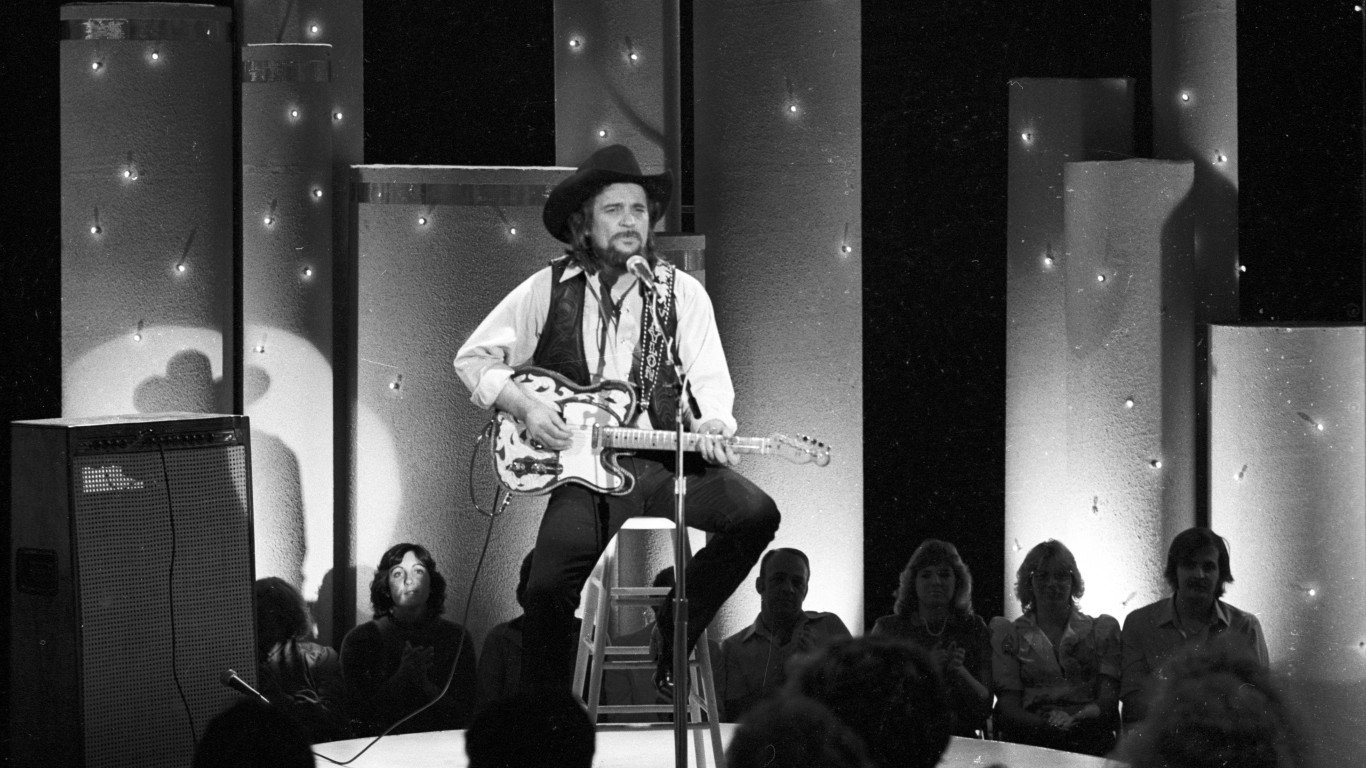
23. Waylon Jennings
> Probability two random songs in catalog will be thematically distinct: 83.8%
> Billboard Hot 100 hits: 6
> Time on the Hot 100 chart: 36 weeks
> Biggest Hot 100 hit: Luckenbach, Texas (Back To The Basics Of Love) (No. 25 for 2 weeks)
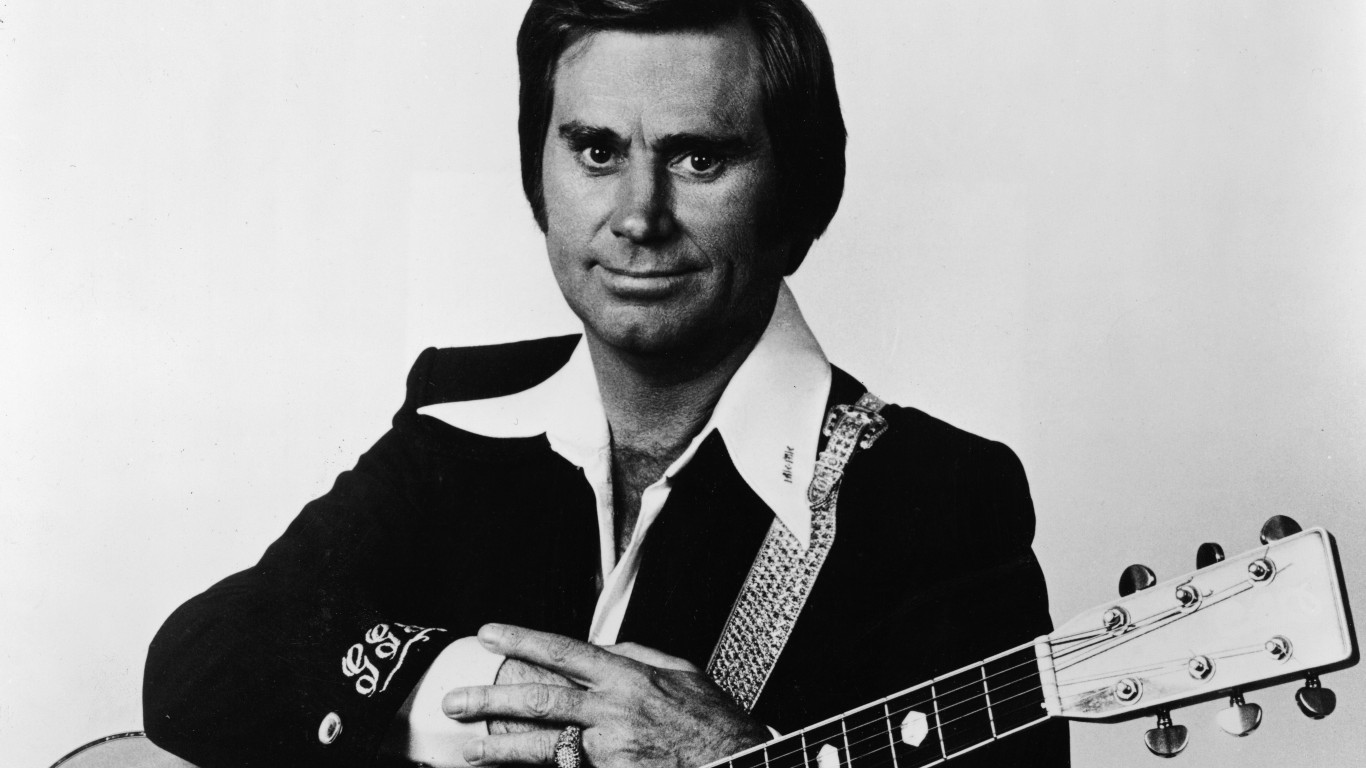
22. George Jones
> Probability two random songs in catalog will be thematically distinct: 83.9%
> Billboard Hot 100 hits: 6
> Time on the Hot 100 chart: 18 weeks
> Biggest Hot 100 hit: White Lightning (No. 73 for 2 weeks)
[in-text-ad-2]
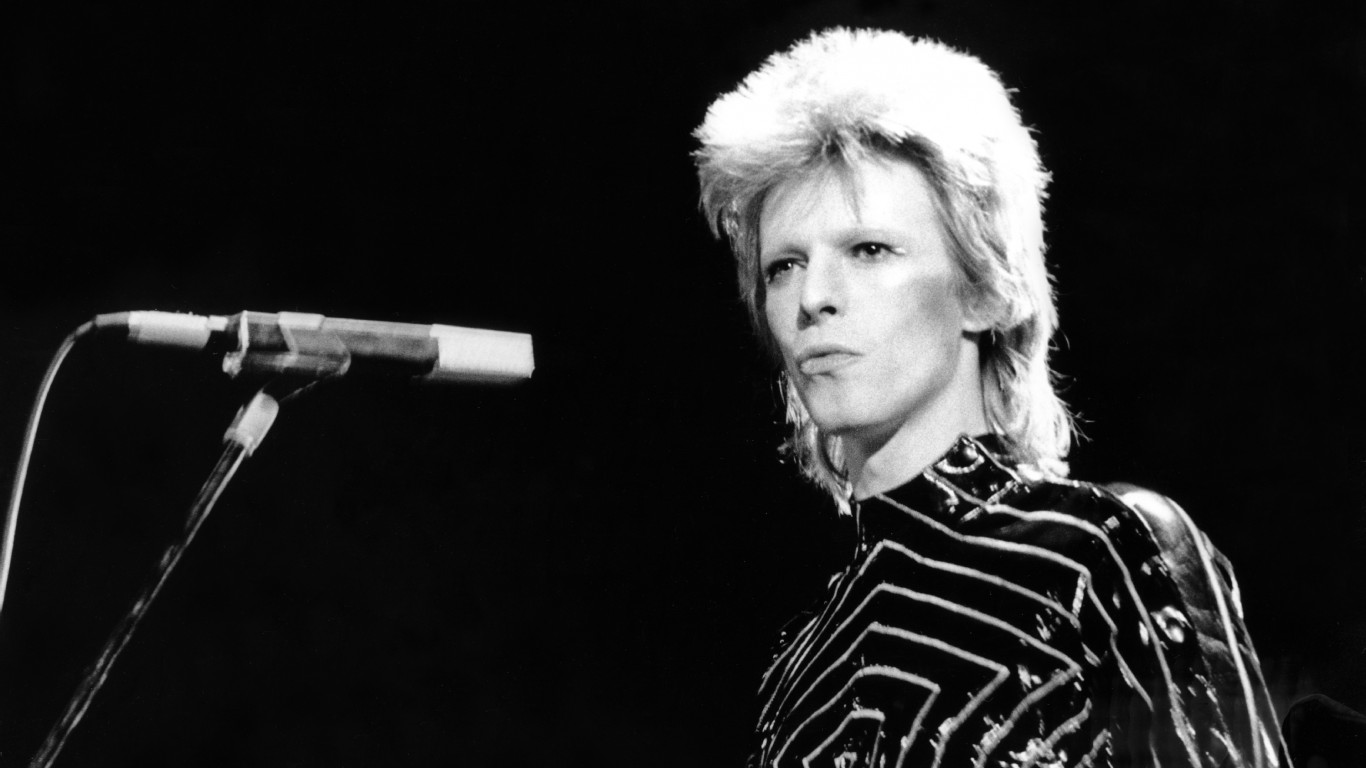
21. David Bowie
> Probability two random songs in catalog will be thematically distinct: 84.0%
> Billboard Hot 100 hits: 27
> Time on the Hot 100 chart: 302 weeks
> Biggest Hot 100 hit: Let’s Dance (No. 1 for 1 week)
20. Bobby Darin
> Probability two random songs in catalog will be thematically distinct: 84.2%
> Billboard Hot 100 hits: 40
> Time on the Hot 100 chart: 333 weeks
> Biggest Hot 100 hit: Mack The Knife (No. 1 for 9 weeks)
[in-text-ad]
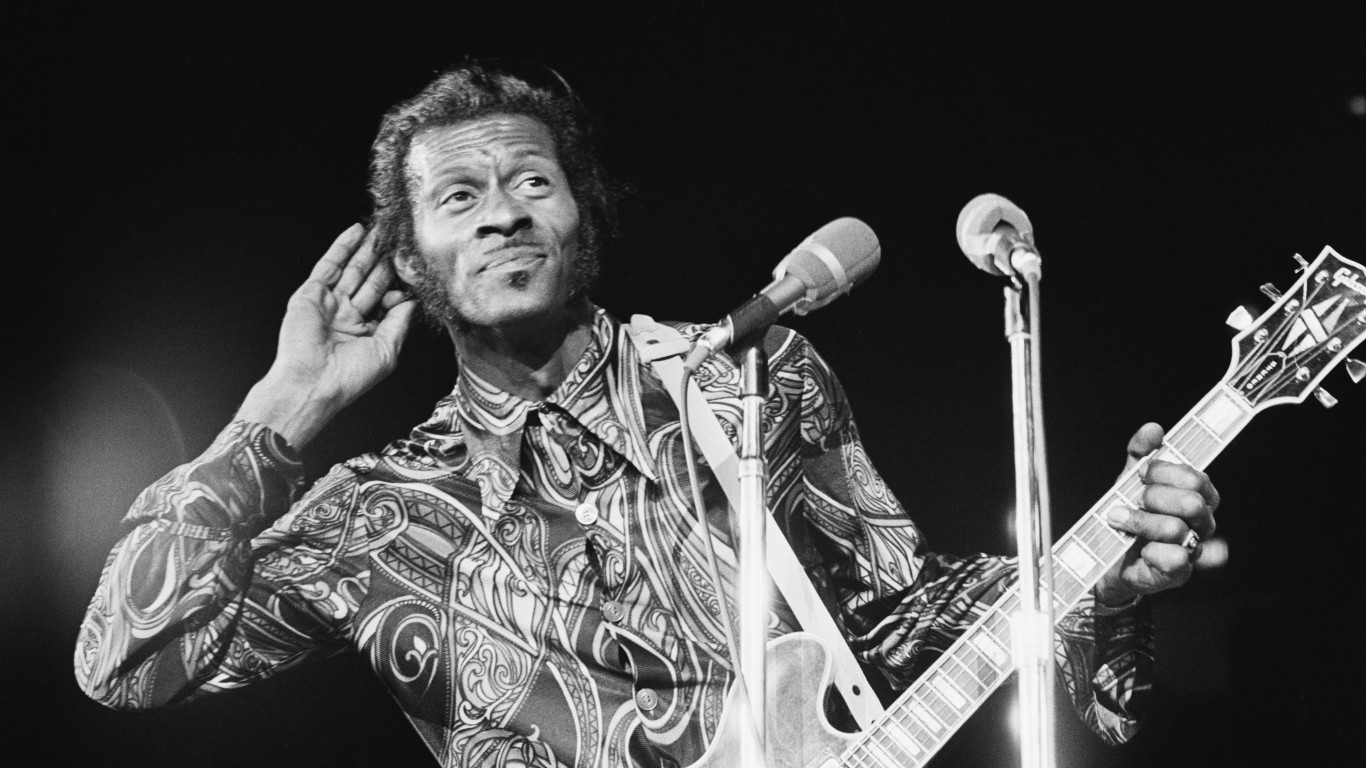
19. Chuck Berry
> Probability two random songs in catalog will be thematically distinct: 84.4%
> Billboard Hot 100 hits: 19
> Time on the Hot 100 chart: 157 weeks
> Biggest Hot 100 hit: My Ding-A-Ling (No. 1 for 2 weeks)
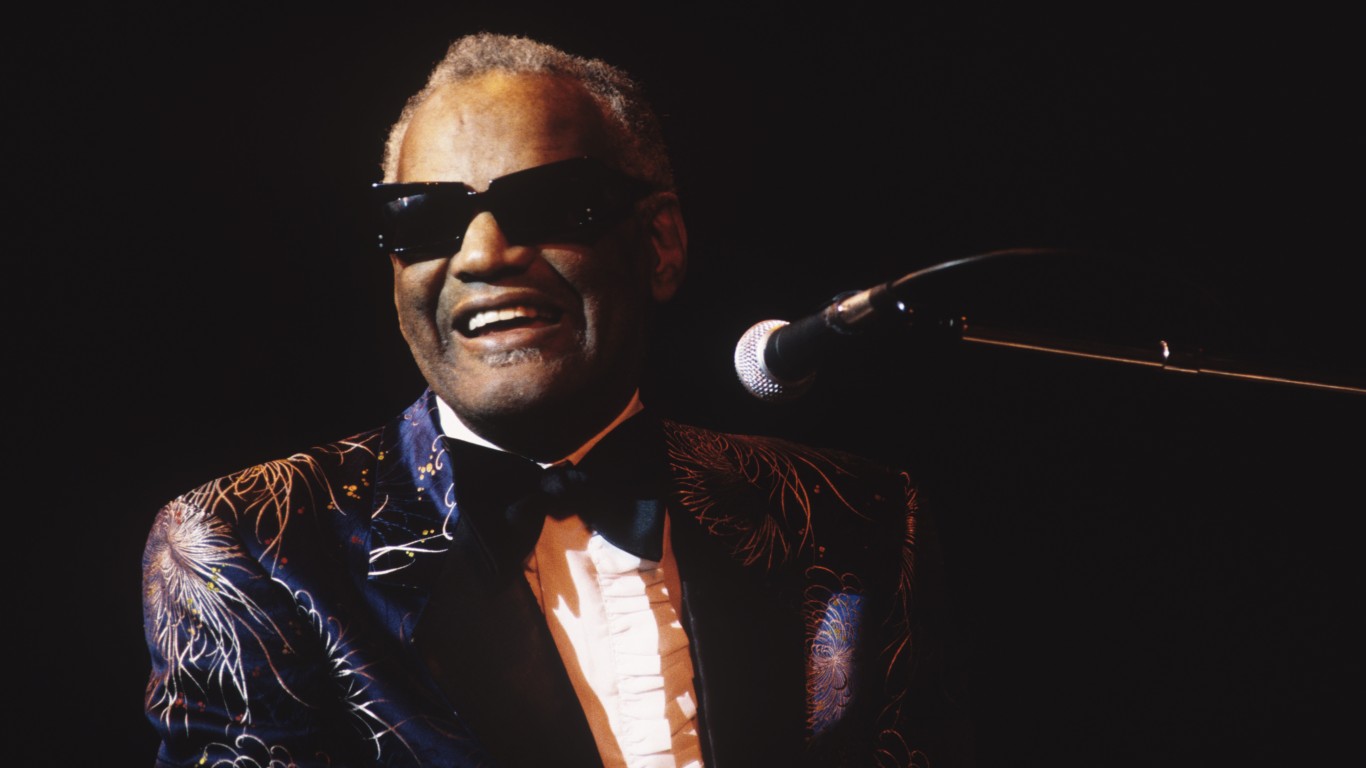
18. Ray Charles
> Probability two random songs in catalog will be thematically distinct: 84.5%
> Billboard Hot 100 hits: 73
> Time on the Hot 100 chart: 530 weeks
> Biggest Hot 100 hit: I Can’t Stop Loving You (No. 1 for 5 weeks)
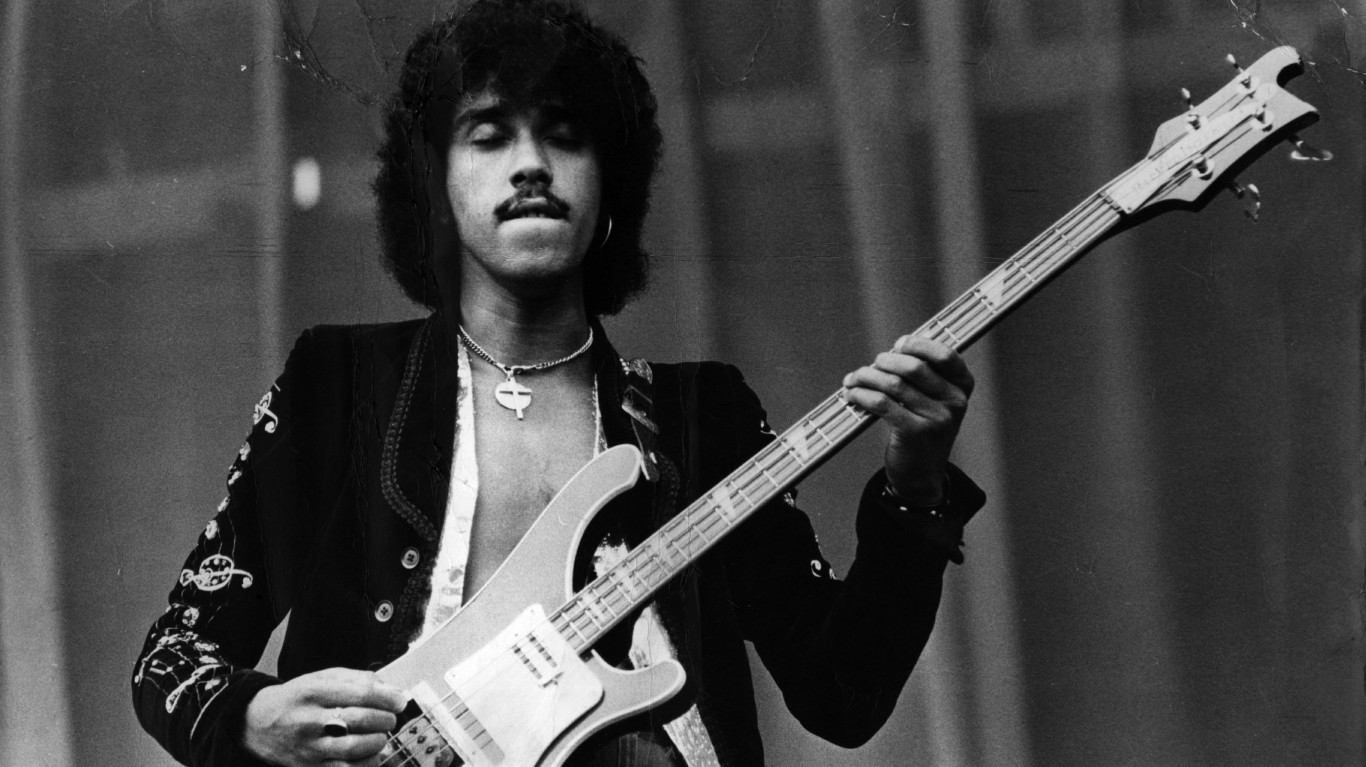
17. Thin Lizzy
> Probability two random songs in catalog will be thematically distinct: 85.4%
> Billboard Hot 100 hits: 2
> Time on the Hot 100 chart: 25 weeks
> Biggest Hot 100 hit: The Boys Are Back In Town (No. 12 for 1 week)
[in-text-ad-2]
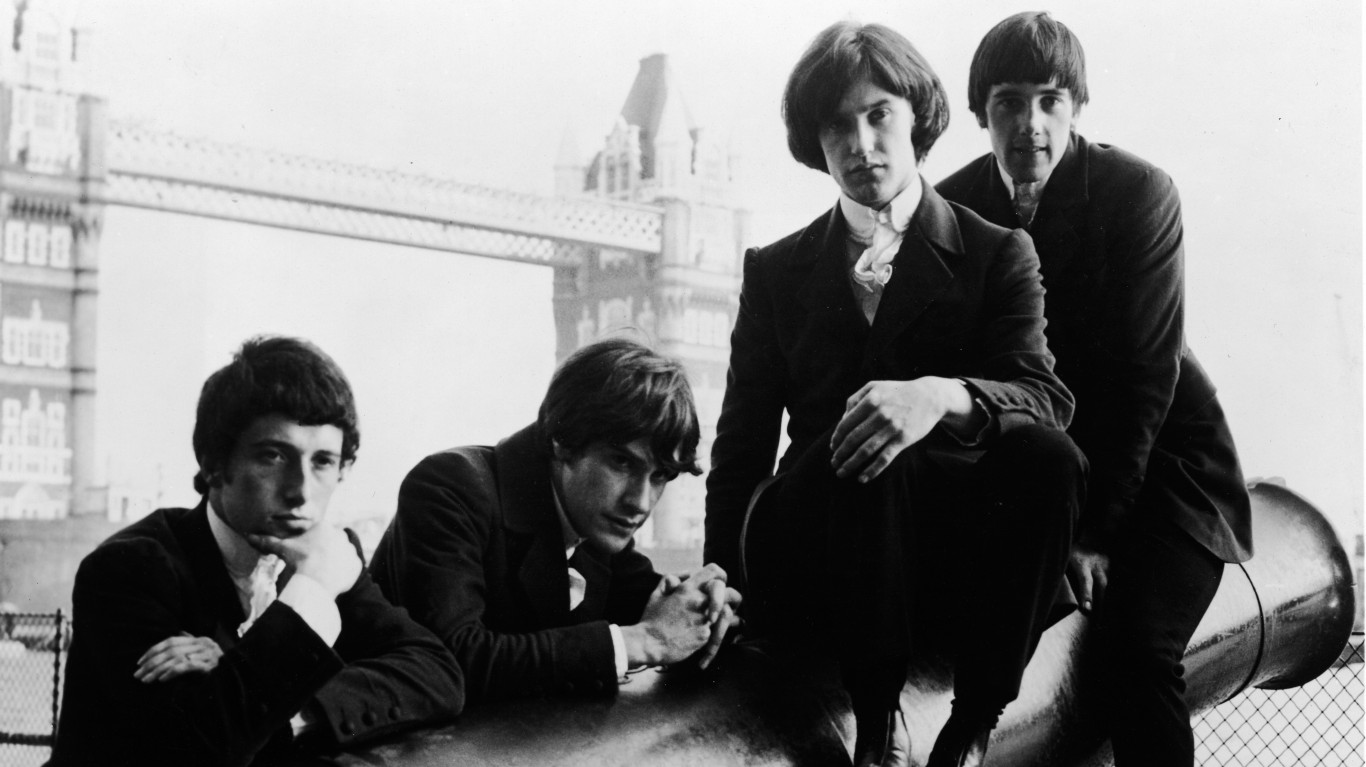
16. The Kinks
> Probability two random songs in catalog will be thematically distinct: 85.4%
> Billboard Hot 100 hits: 22
> Time on the Hot 100 chart: 217 weeks
> Biggest Hot 100 hit: Come Dancing (No. 6 for 2 weeks)
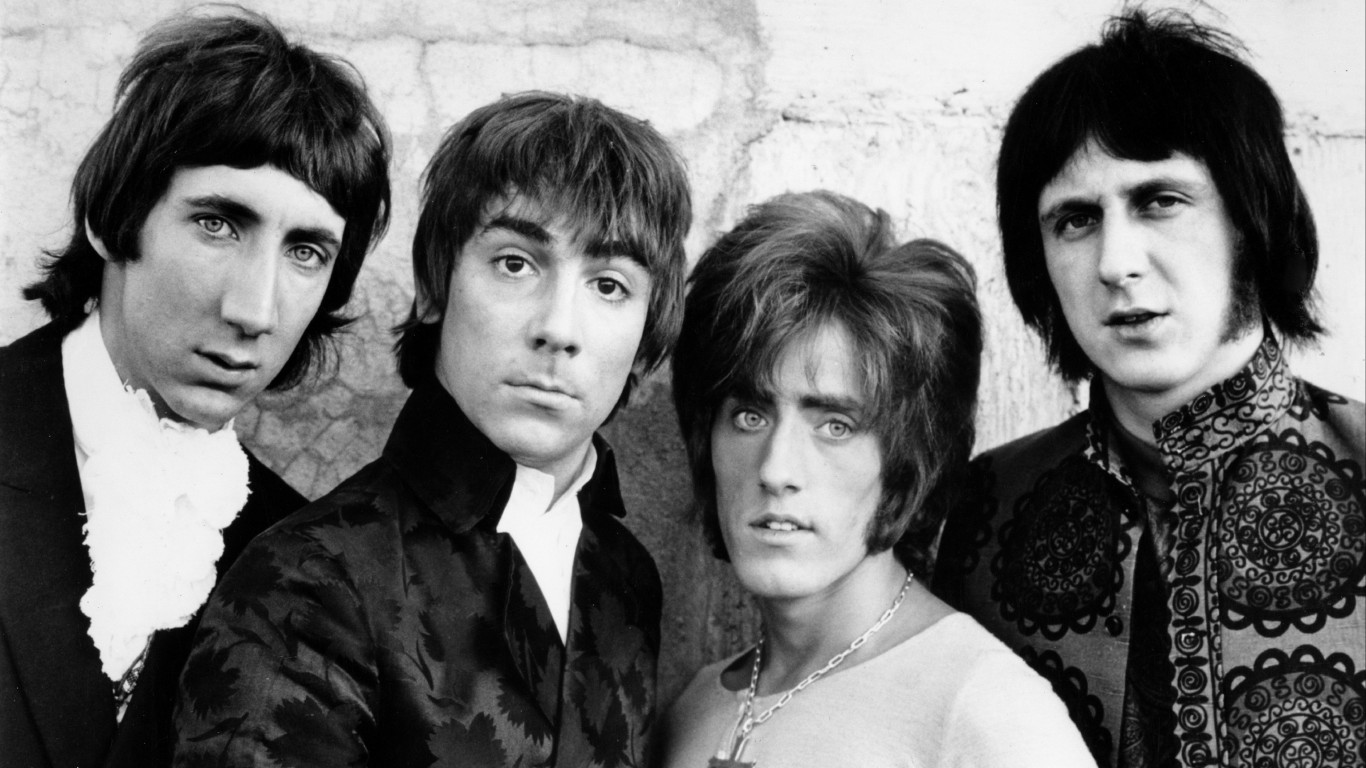
15. The Who
> Probability two random songs in catalog will be thematically distinct: 85.4%
> Billboard Hot 100 hits: 26
> Time on the Hot 100 chart: 231 weeks
> Biggest Hot 100 hit: I Can See For Miles (No. 9 for 2 weeks)
[in-text-ad]
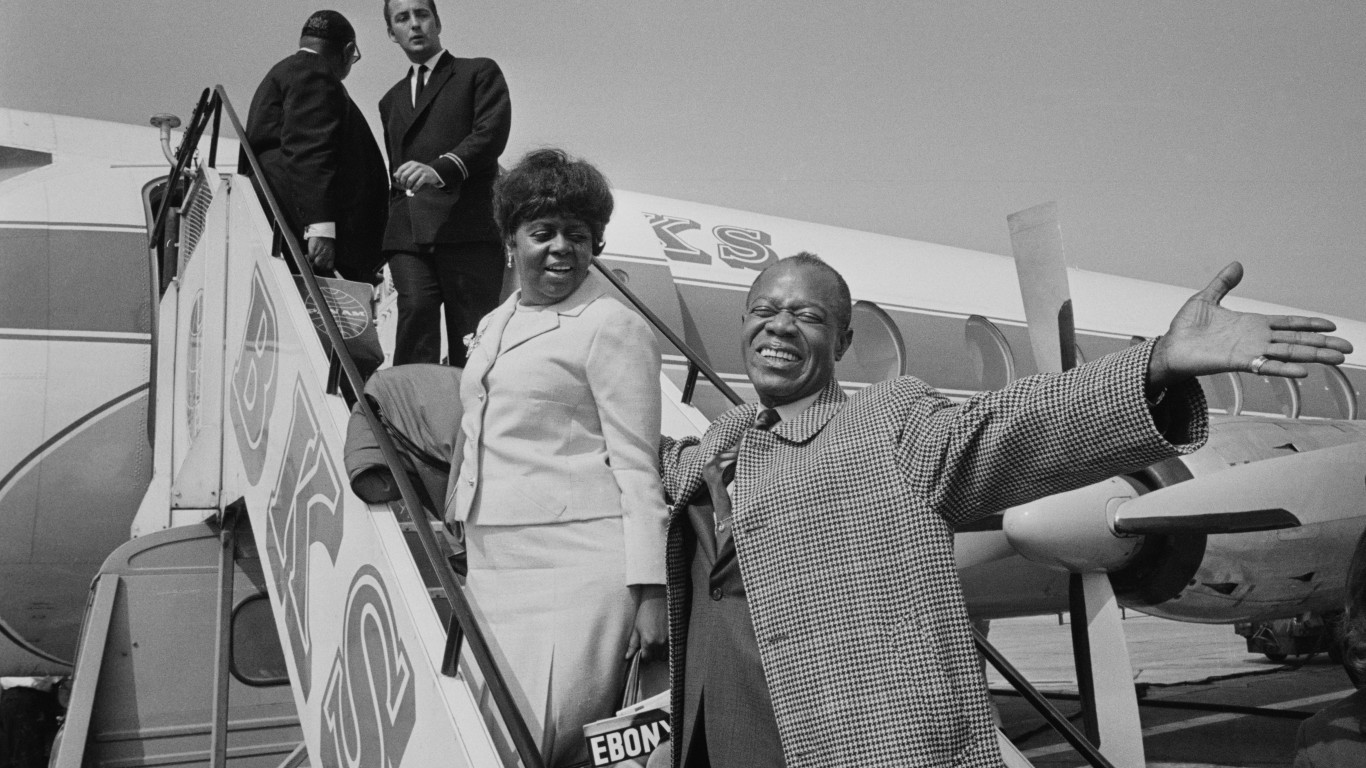
14. Louis Armstrong
> Probability two random songs in catalog will be thematically distinct: 85.6%
> Billboard Hot 100 hits: 5
> Time on the Hot 100 chart: 50 weeks
> Biggest Hot 100 hit: Hello, Dolly! (No. 1 for 1 week)

13. Gordon Lightfoot
> Probability two random songs in catalog will be thematically distinct: 85.6%
> Billboard Hot 100 hits: 11
> Time on the Hot 100 chart: 123 weeks
> Biggest Hot 100 hit: Sundown (No. 1 for 1 week)
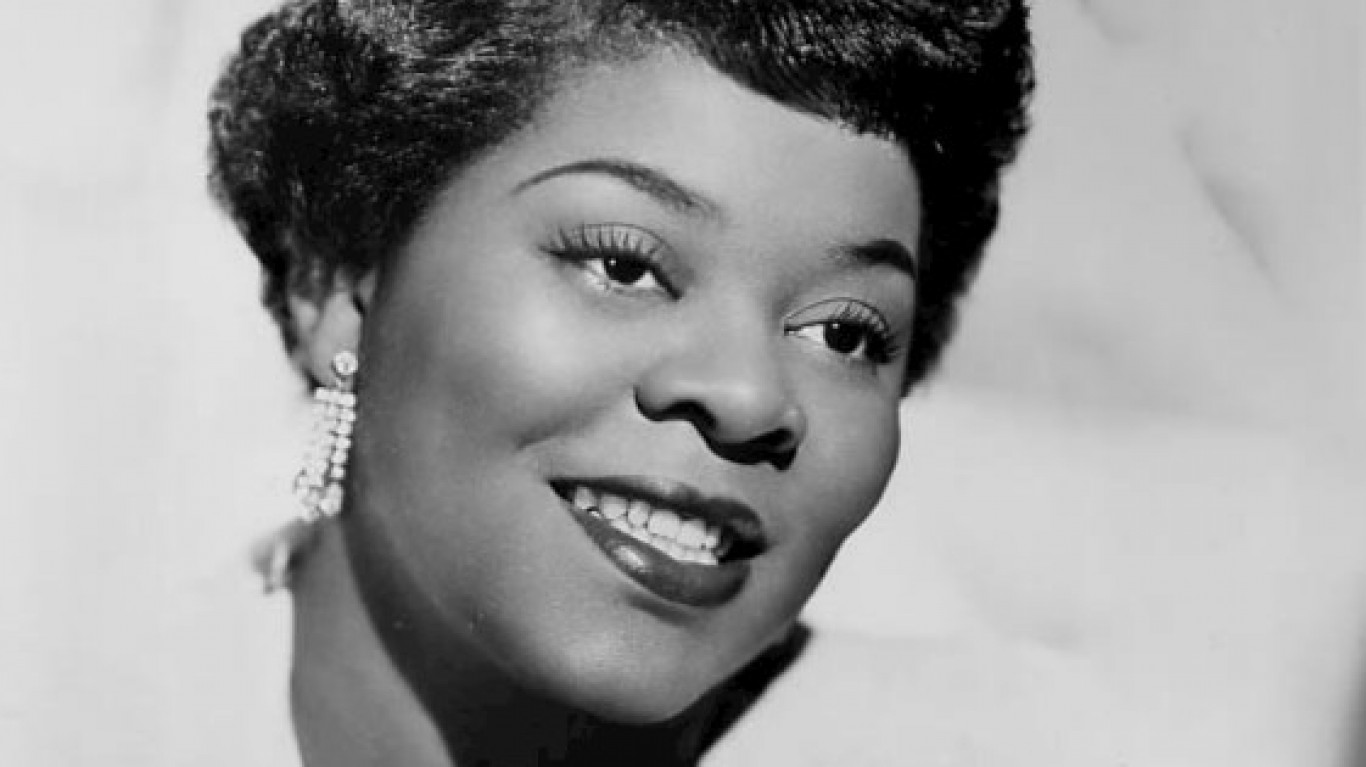
12. Dinah Washington
> Probability two random songs in catalog will be thematically distinct: 85.6%
> Billboard Hot 100 hits: 21
> Time on the Hot 100 chart: 142 weeks
> Biggest Hot 100 hit: What A Diff’rence A Day Makes (No. 8 for 2 weeks)
[in-text-ad-2]
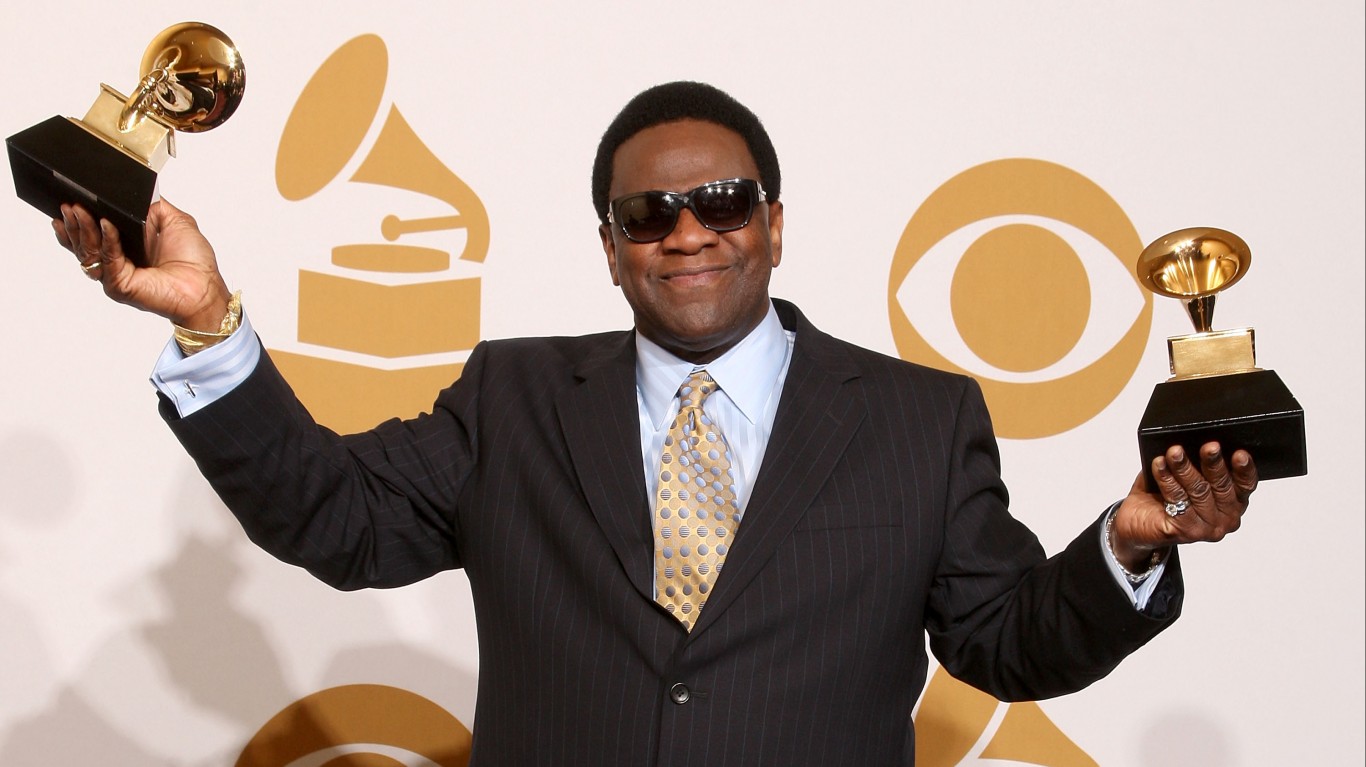
11. Al Green
> Probability two random songs in catalog will be thematically distinct: 85.7%
> Billboard Hot 100 hits: 19
> Time on the Hot 100 chart: 228 weeks
> Biggest Hot 100 hit: Let’s Stay Together (No. 1 for 1 week)
10. Joe Cocker
> Probability two random songs in catalog will be thematically distinct: 85.8%
> Billboard Hot 100 hits: 19
> Time on the Hot 100 chart: 191 weeks
> Biggest Hot 100 hit: Up Where We Belong (No. 1 for 3 weeks)
[in-text-ad]
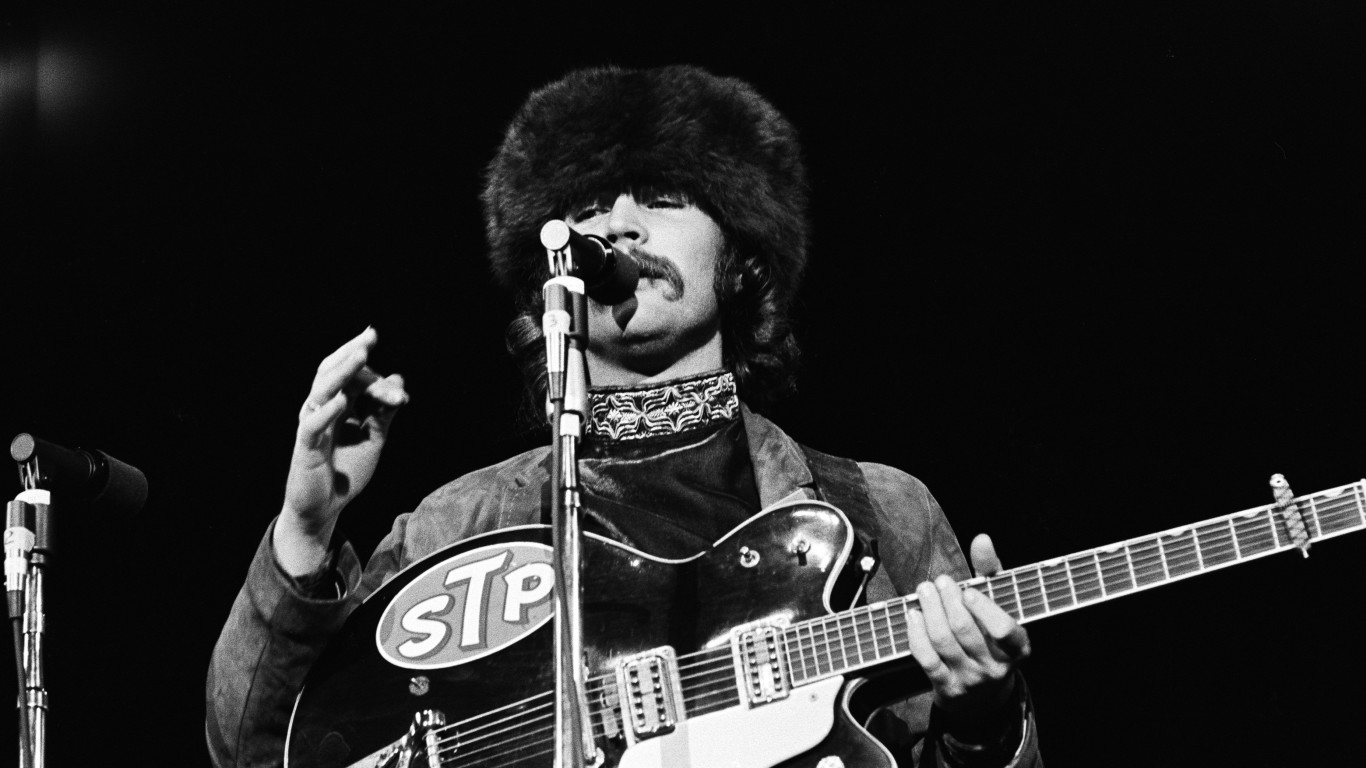
9. The Byrds
> Probability two random songs in catalog will be thematically distinct: 86.0%
> Billboard Hot 100 hits: 16
> Time on the Hot 100 chart: 102 weeks
> Biggest Hot 100 hit: Turn! Turn! Turn! (To Everything There Is A Season) (No. 1 for 3 weeks)
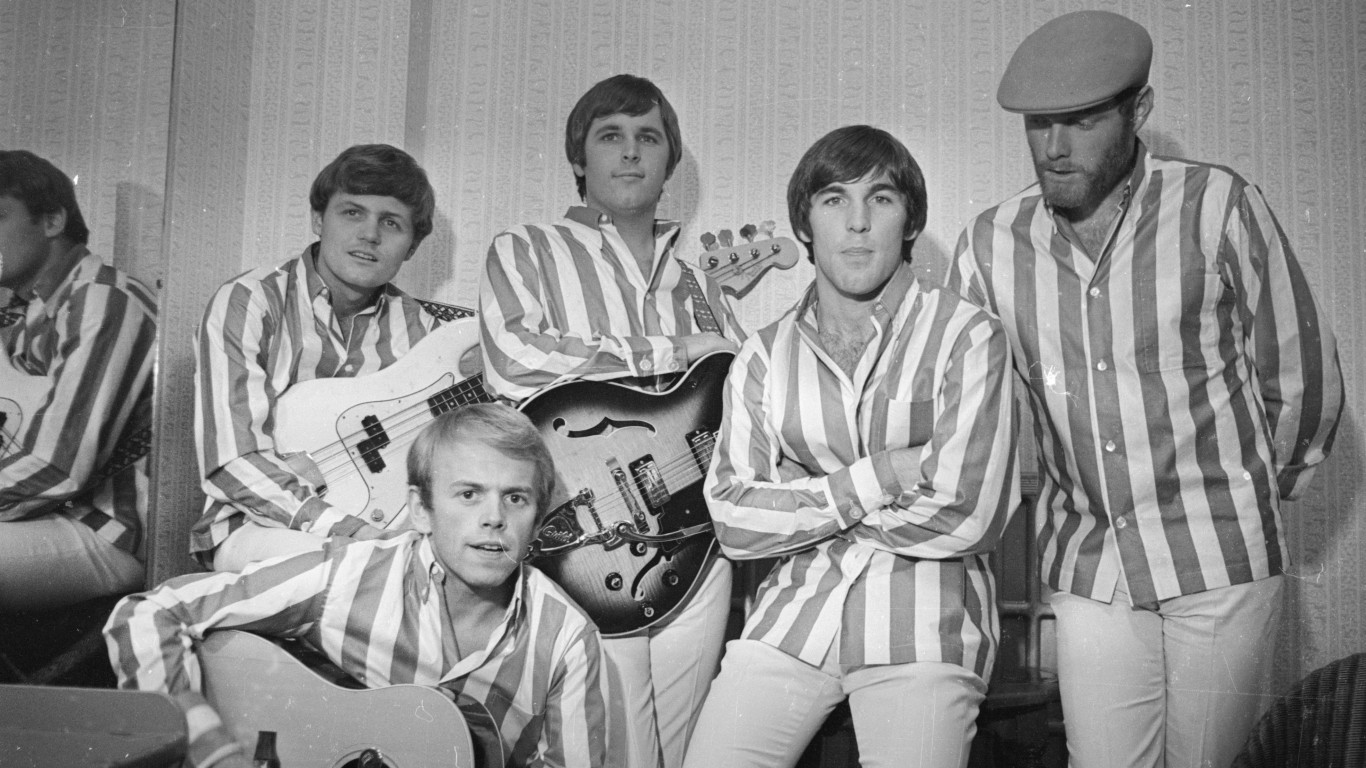
8. The Beach Boys
> Probability two random songs in catalog will be thematically distinct: 86.2%
> Billboard Hot 100 hits: 55
> Time on the Hot 100 chart: 550 weeks
> Biggest Hot 100 hit: Kokomo (From”Cocktail” ) (No. 1 for 1 week)
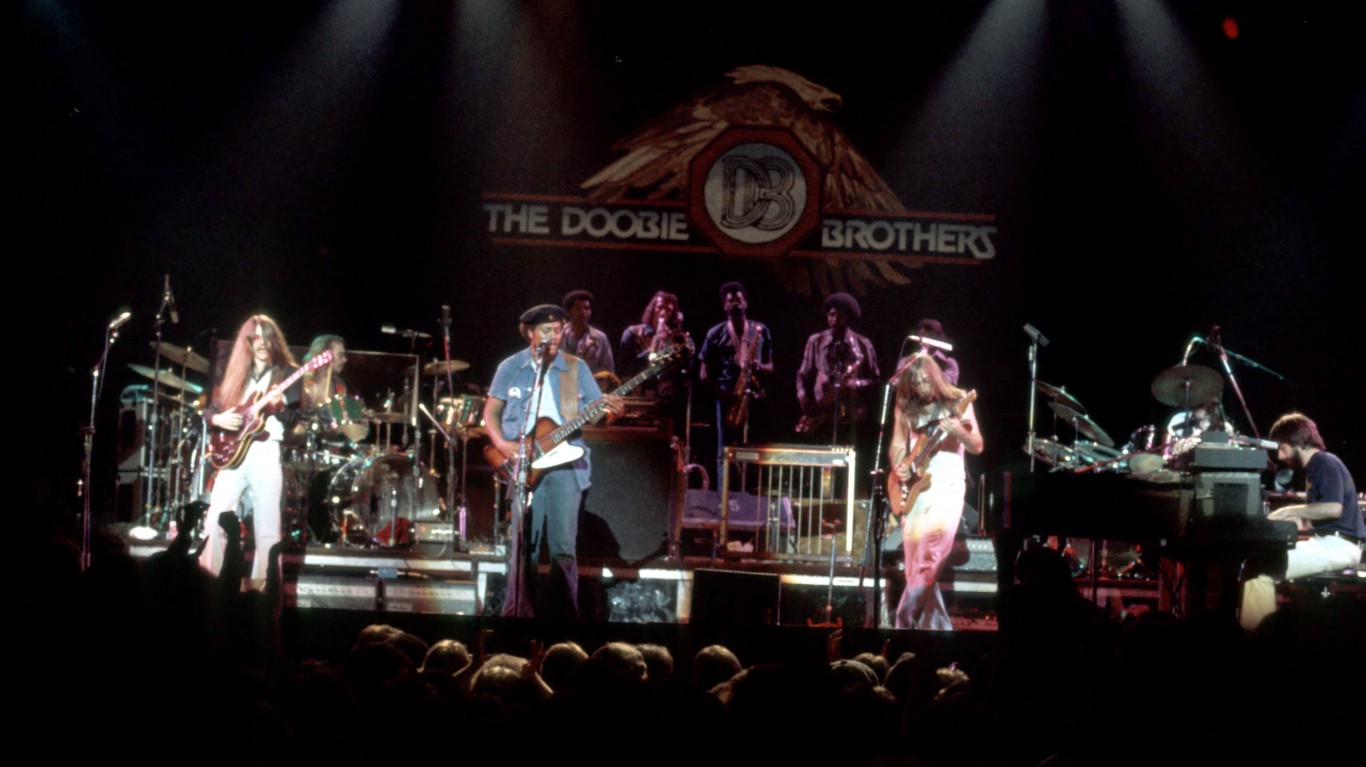
7. The Doobie Brothers
> Probability two random songs in catalog will be thematically distinct: 86.4%
> Billboard Hot 100 hits: 27
> Time on the Hot 100 chart: 280 weeks
> Biggest Hot 100 hit: What A Fool Believes (No. 1 for 1 week)
[in-text-ad-2]
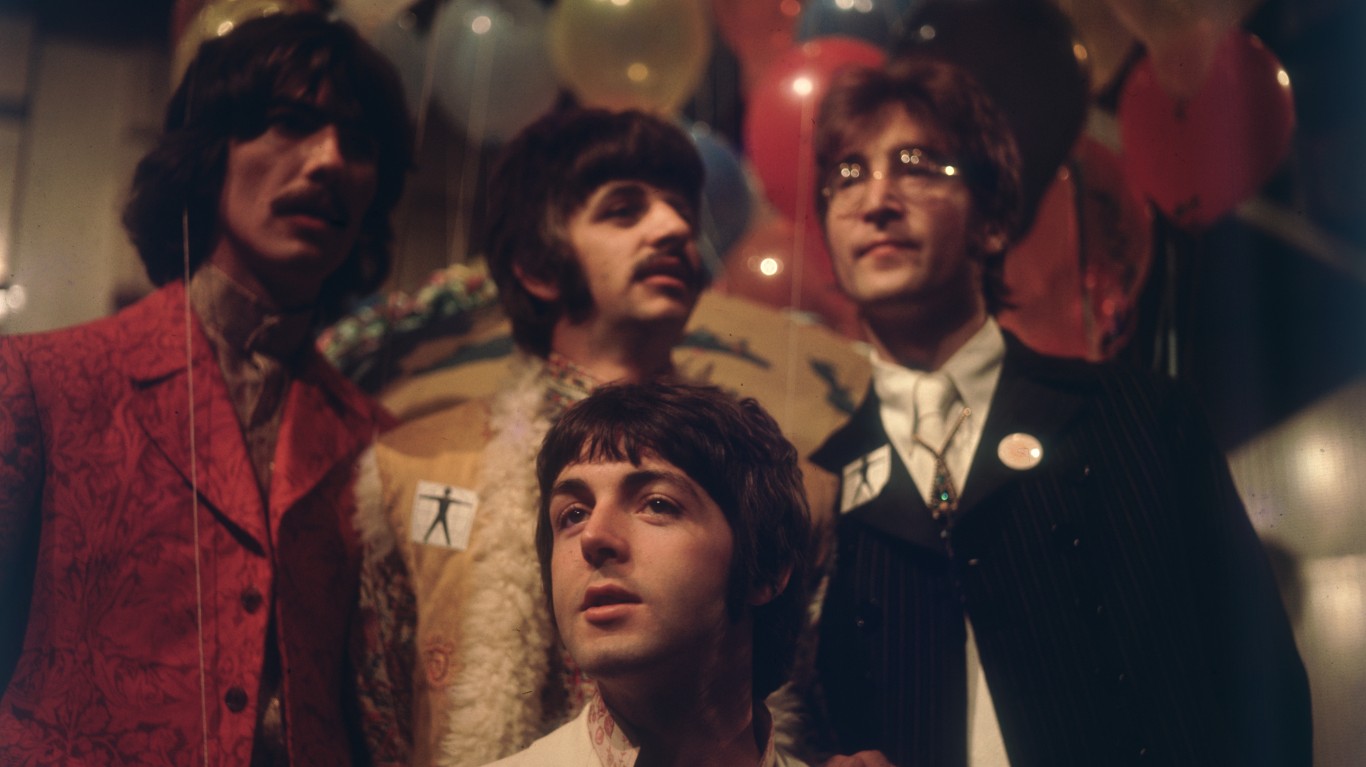
6. The Beatles
> Probability two random songs in catalog will be thematically distinct: 86.5%
> Billboard Hot 100 hits: 69
> Time on the Hot 100 chart: 608 weeks
> Biggest Hot 100 hit: The Long And Winding Road/For You Blue (No. 1 for 2 weeks)
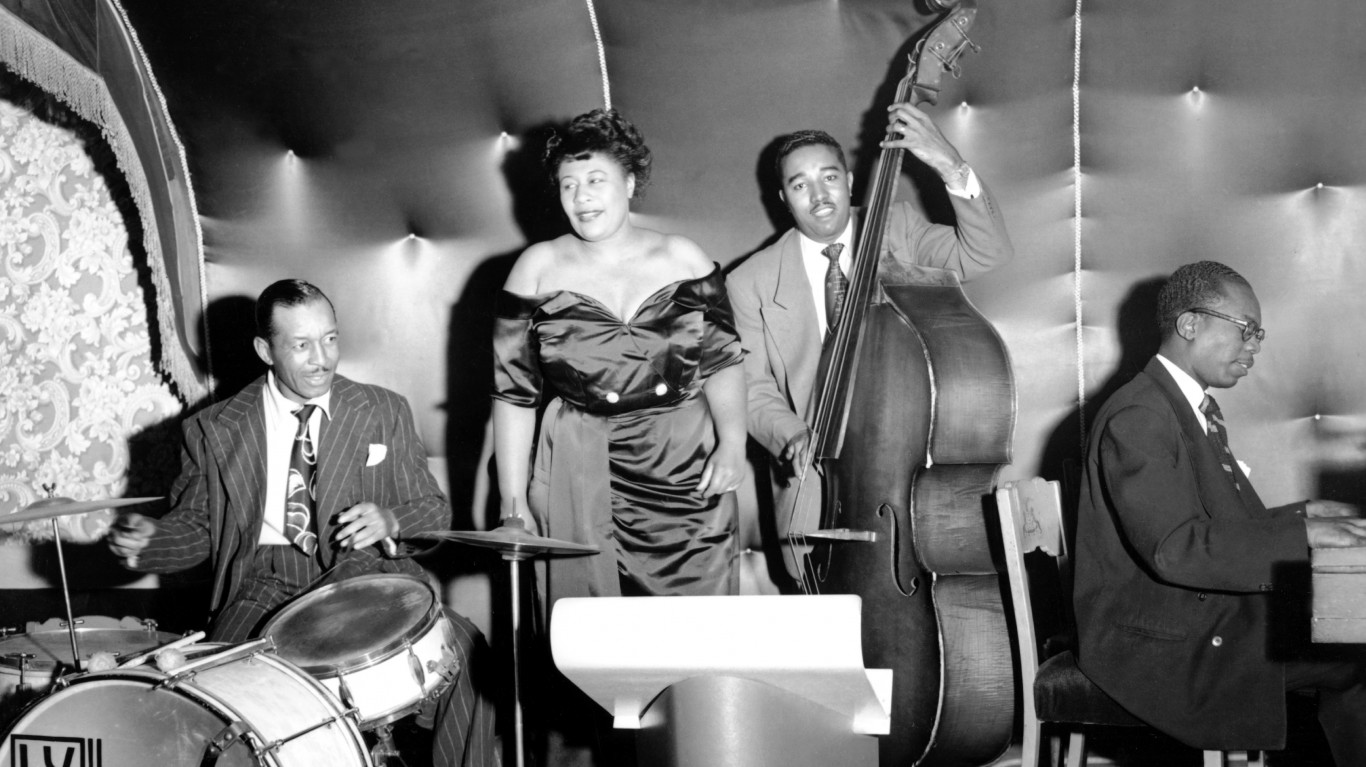
5. Ella Fitzgerald
> Probability two random songs in catalog will be thematically distinct: 86.6%
> Billboard Hot 100 hits: 3
> Time on the Hot 100 chart: 22 weeks
> Biggest Hot 100 hit: Mack The Knife (No. 27 for 1 week)
[in-text-ad]
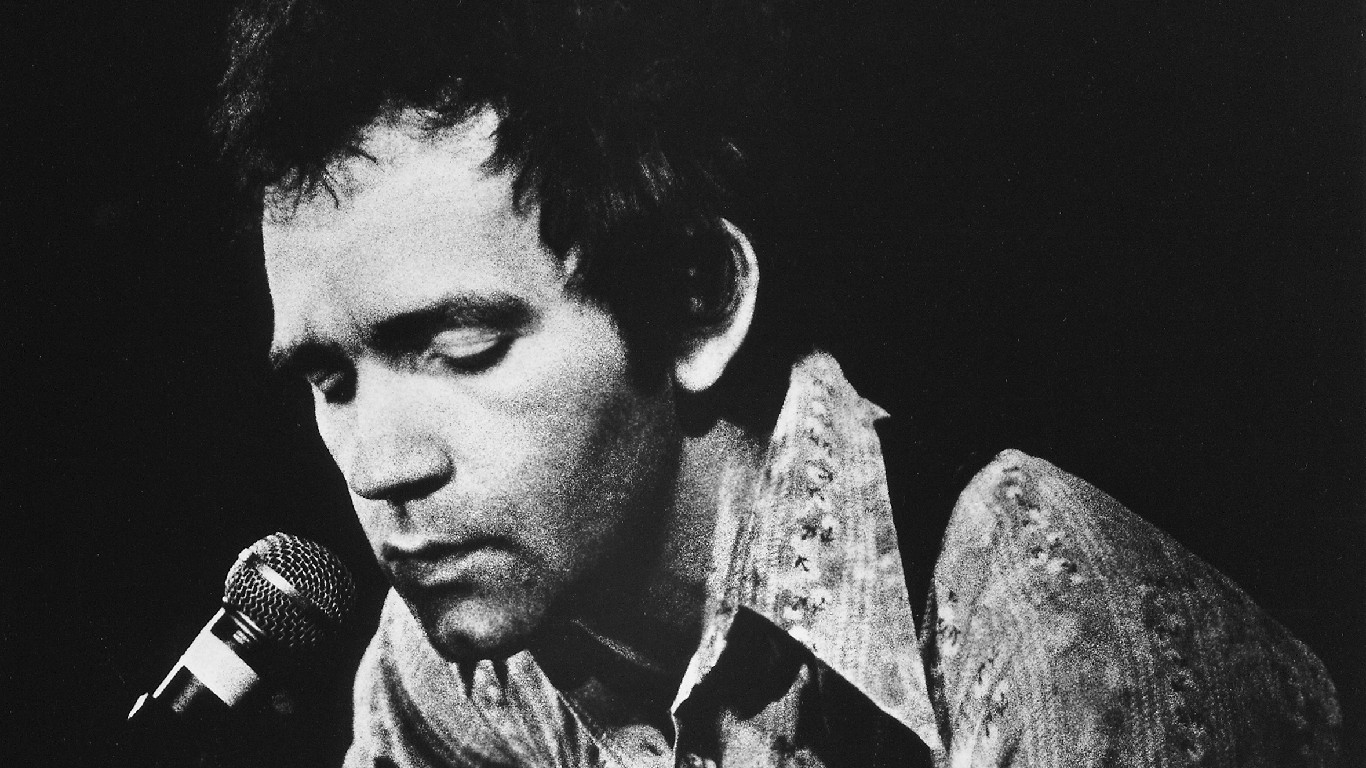
4. J.J. Cale
> Probability two random songs in catalog will be thematically distinct: 86.9%
> Billboard Hot 100 hits: 4
> Time on the Hot 100 chart: 36 weeks
> Biggest Hot 100 hit: Crazy Mama (No. 22 for 2 weeks)
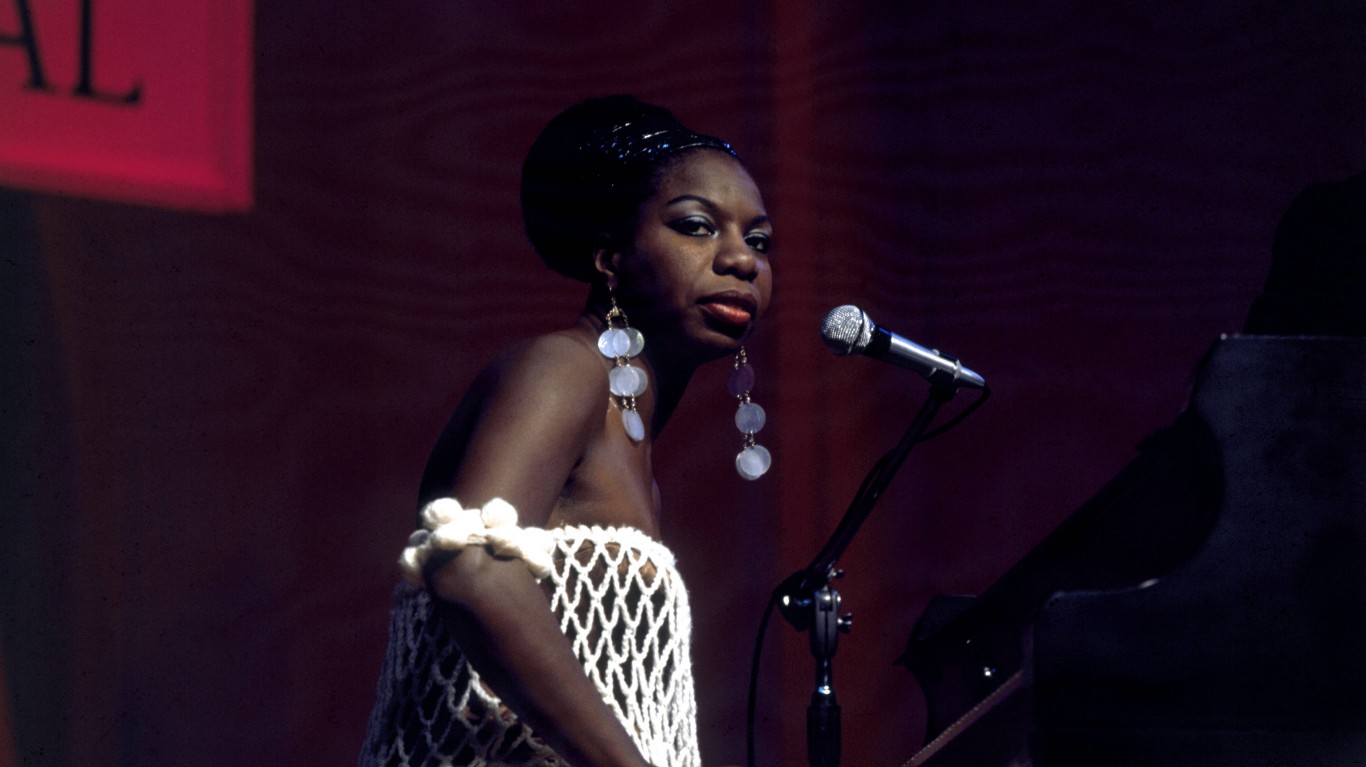
3. Nina Simone
> Probability two random songs in catalog will be thematically distinct: 86.9%
> Billboard Hot 100 hits: 6
> Time on the Hot 100 chart: 35 weeks
> Biggest Hot 100 hit: I Loves You, Porgy (No. 18 for 1 week)
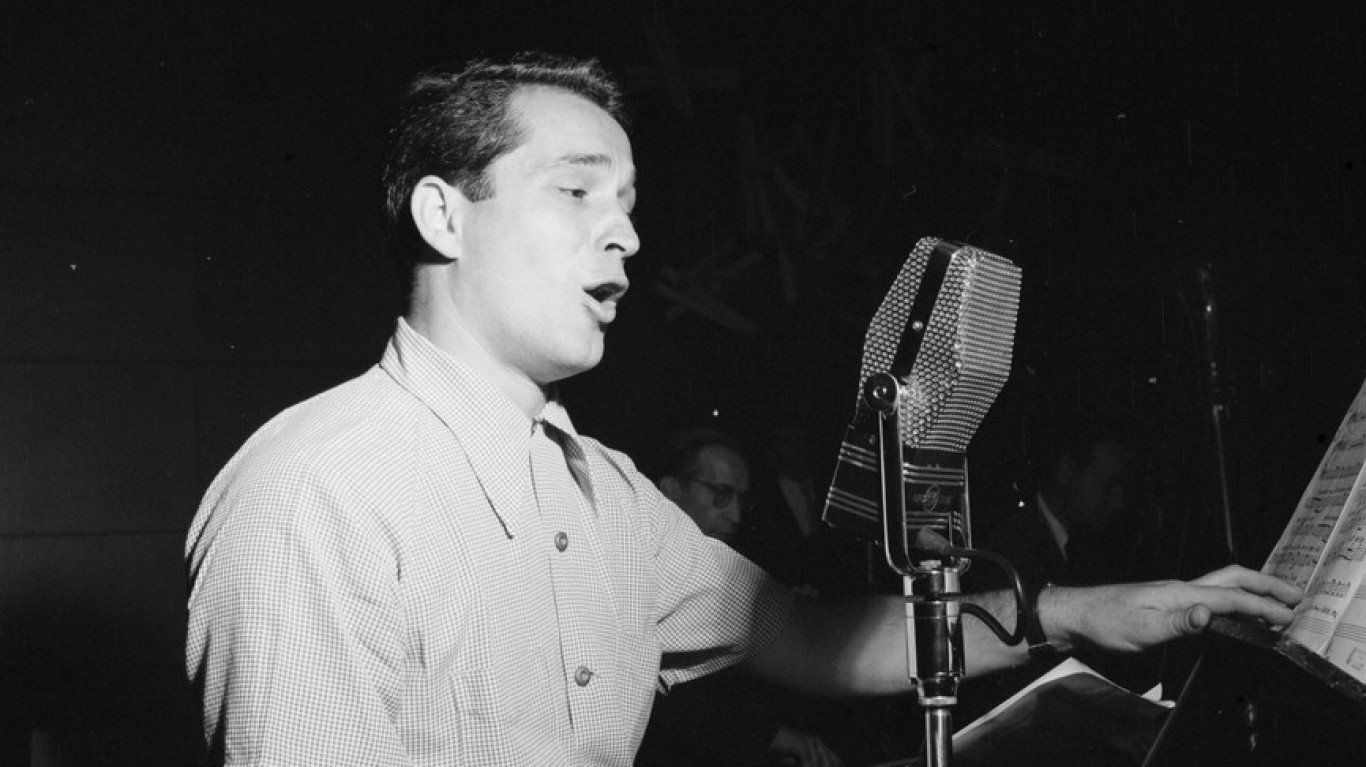
2. Perry Como
> Probability two random songs in catalog will be thematically distinct: 87.6%
> Billboard Hot 100 hits: 22
> Time on the Hot 100 chart: 173 weeks
> Biggest Hot 100 hit: It’s Impossible (No. 10 for 1 week)
[in-text-ad-2]
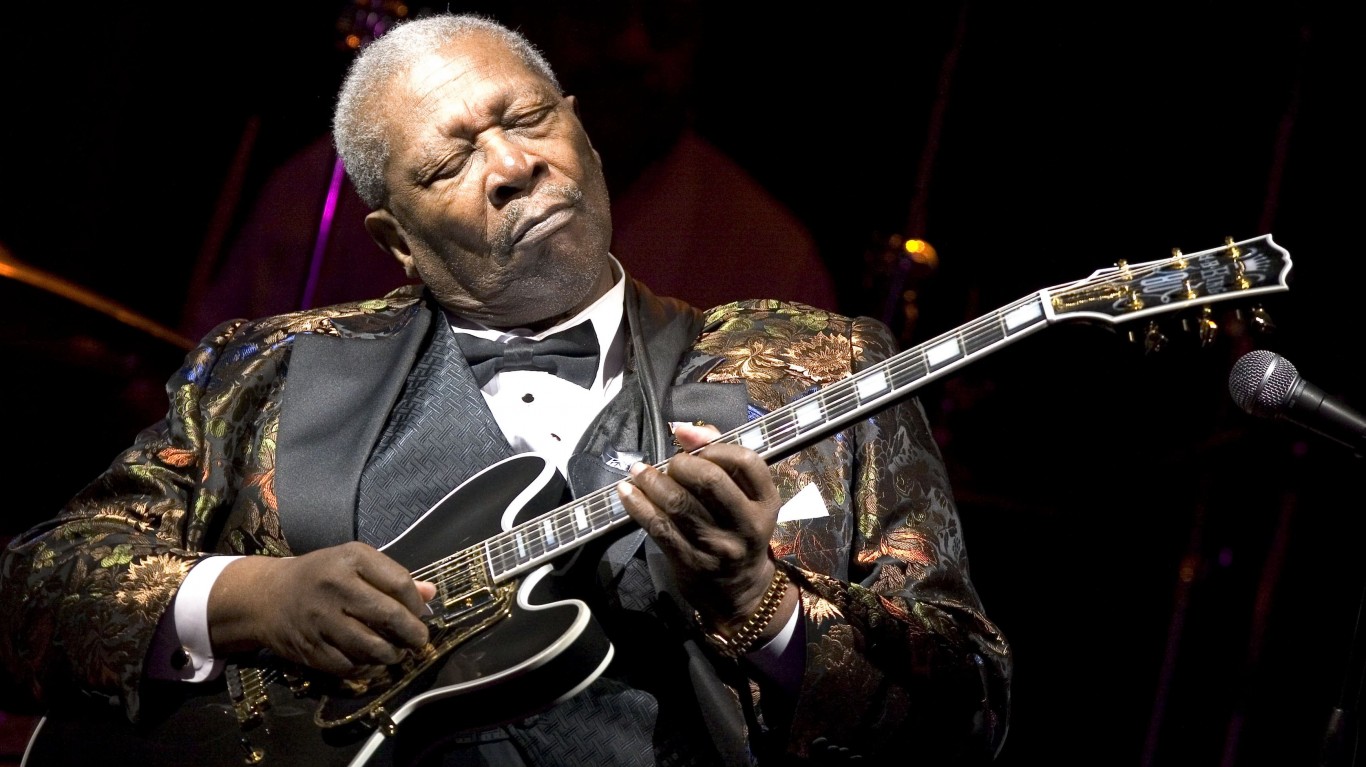
1. B.B. King
> Probability two random songs in catalog will be thematically distinct: 88.8%
> Billboard Hot 100 hits: 32
> Time on the Hot 100 chart: 207 weeks
> Biggest Hot 100 hit: The Thrill Is Gone (No. 15 for 2 weeks)
Methodology
To determine the musicians with the most diverse output in terms of subject matter and/or emotional approach, 24/7 Tempo reviewed data on the sentiment in popular songs appearing in “Temporal Analysis and Visualisation of Music,” a paper presented in October 2020 at the Brazilian Computing Society’s 17th National Meeting On Artificial and Computational Intelligence in Rio Grande, Brazil. The dataset categorizes 28,000 songs released between 1950 and 2019 in seven genres (rock, reggae, jazz,blues, hip hop, country, and pop).
The songs were analyzed across 15 thematic categories – “sadness,” “world/life,” “romantic,” “violence,” “communication,” “light/visual perception,” “obscene,” “feelings,” “night/time,” “movement/places,” “family/spirituality,” “girls,” “dating,” “family/spiritual,” and “shake the audience” – based on their lyrics, acousticness, danceability, loudness, instrumentalness, valence (a song’s musical positiveness from happy to sad or depressed), and energy. For our list, artists were ranked based on the probability that two of their songs, picked at random, would be in different thematic categories.
Only artists with at least one song in the Billboard Hot 100 were included for consideration. Data on Hot 100 performance came from Billboard. An artist’s biggest Hot 100 hit was determined using an inverse point system wherein a week at No. 1 on the chart is worth 100 points, a week at No. 2 worth 99 points, and so on, until at a week at No. 100, which is worth one point. All data is current as of January 2022.
Credit card companies are handing out rewards and benefits to win the best customers. A good cash back card can be worth thousands of dollars a year in free money, not to mention other perks like travel, insurance, and access to fancy lounges. See our top picks for the best credit cards today. You won’t want to miss some of these offers.
Flywheel Publishing has partnered with CardRatings for our coverage of credit card products. Flywheel Publishing and CardRatings may receive a commission from card issuers.
Thank you for reading! Have some feedback for us?
Contact the 24/7 Wall St. editorial team.


